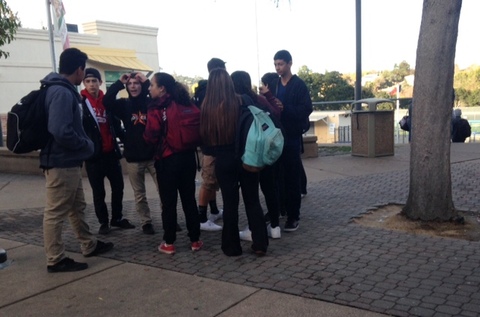The halls of Carlmont are relatively peaceful in the year of 2015, but if one listens in to the casual conversation that floats throughout the campus they are bound to hear some form of hate speech snaking its way through the halls.
PEW Research Center recently came out with a study estimating that 40% of millennials are “OK with limiting free speech if it is considered offensive to minorities.” The reactions to these findings vary from casual nods of agreement to speechless concern.
 Some students stand on the wall with their beliefs that we should be able to speak freely as long as we’re respectful. One student with this belief is junior Alex Girlea, “It’s a pretty controversial issue because there is so many sides to it and depending on who you are as an individual, you see things differently. There isn’t really a way to figure it out because it’s very hard to compromise.”
Some students stand on the wall with their beliefs that we should be able to speak freely as long as we’re respectful. One student with this belief is junior Alex Girlea, “It’s a pretty controversial issue because there is so many sides to it and depending on who you are as an individual, you see things differently. There isn’t really a way to figure it out because it’s very hard to compromise.”
Junior Ashley Herrero, who is very active on social media, a place full of hate speech, said, “I think people have the right to say what they want to say but if their opinion spreads hate and negative feelings then what they say shouldn’t be respected.”
“We shouldn’t necessarily take away that right even though they are slightly abusing it,” Herrero continued, “but I think [people that target minorities with hate speech] are very uneducated. And I constantly get into internet fights with people, although I don’t take it personally; I find it funny.”
Millennials are the most diverse generation ever in the U.S. According to the Census Bureau Projects the U.S. will become a nation with a majority of minorities by 2043. This could be the cause of the the spike in the want to restrict freedom of speech, according to PEW Research Center.
Greg Schoenstein, a History teacher, is a Generation X. A generation that, according to PEW Research Center, is, “Savvy, skeptical and self-reliant; they’re not into preening or pampering.”
Schoenstein said, “[Hate speech] is distasteful and I don’t like it and I don’t agree with it. [However,] you can denounce it all you want but in terms of restricting someone’s right to say it, I think it’s protected speech no matter how ugly or nasty. We’re in a weird place if we believe that speech should be restricted if it hurts peoples feelings.”
Both Girlea and Schoenstein agree that if the United States made laws restricting our freedom of speech that there would be nothing to stop people for pushing for more restrictions.
Girlea said, “If you make hate speech against the law then people will start abusing that, and it will just go insane; people will sue someone for saying that their shirt is ugly.”
Shoenstein said, “Once you open the door to restricting speech where do you draw the line?”
Carlmont, being a public school, has its own speech restrictions meant to protect students and create a safe learning environment. But whether or not one agrees with the millennials in making some of these restrictions apply to all of the United States, they currently have the right to tell someone their opinion of it.


